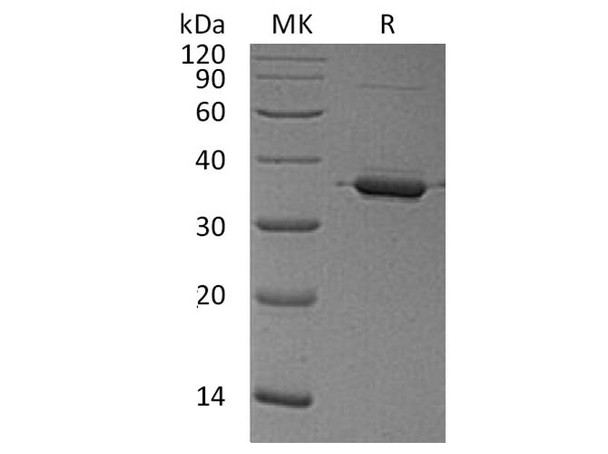Human Annexin A2/ANXA2 Recombinant Protein (RPES2664)
- SKU:
- RPES2664
- Product Type:
- Recombinant Protein
- Species:
- Human
- Research Area:
- Immunology
Frequently bought together:
Description
system_update_altDatasheet
Human Annexin A2/ANXA2 Recombinant Protein
ANXA2 (Annexin A2) is a type of annexin that has functions in cell growth regulation and signal transduction pathways. The protein ANXA2 is associated with sickle cell osteonecrosis, and the expression of this protein is linked to osteosarcoma metastases. ANXA2 functions as an autocrine factor, it can increase osteoclast formation and bone resorption. ANXA2 is a protein that has been linked to muscular dystrophies. The up-regulation of ANXA2 in humans is associated with colon adenocarcinoma cell differentiation. Human Annexin A2/ANXA2 Recombinant Protein is a highly pure recombinant protein developed by Assay Genie for use in a range of applications.
| Product Name: | Human Annexin A2/ANXA2 Recombinant Protein (RPES2664) |
| Product Code: | RPES2664 |
| Size: | 10µg |
| Species: | Human |
| Expressed Host: | E.coli |
| Synonyms: | Annexin A2, Annexin II, Annexin-2, Calpactin I Heavy Chain, Calpactin-1 Heavy Chain, Chromobindin-8, Lipocortin II, Placental Anticoagulant Protein IV, PAP-IV, Protein I, p36, ANXA2, ANX2, ANX2L4, CAL1H, LPC2D |
| Accession: | P07355 |
| Sequence: | Ser2-Asp339 |
| Fusion tag: | |
| Endotoxin: | <1.0 EU per µg as determined by the LAL method. |
| Protein Construction: | Recombinant Human Annexin A2 is produced by our E.coli expression system and the target gene encoding Ser2-Asp339 is expressed. |
| Purity: | > 95 % as determined by reducing SDS-PAGE. |
| Mol Mass: | 38.6 kDa |
| AP Mol Mass: | 35 kDa |
| Formulation: | Lyophilized from a 0.2 µm filtered solution of 20mM TrisHCl, 150mM NaCl, 1mM EDTA, pH 7.5. |
| Shipping: | This product is provided as lyophilized powder which is shipped with ice packs. |
| Stability and Storage: | Lyophilized proteins are stable for up to 12 months when stored at -20 to -80°C. Reconstituted protein solution can be stored at 4-8°C for 2-7 days. Aliquots of reconstituted samples are stable at < -20°C for 3 months. |








